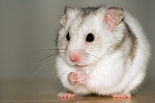 Researchers from Ohio State University College of Medicine have determined that a specific gene plays a role in the weight-gain response to a high-fat diet.
Researchers from Ohio State University College of Medicine have determined that a specific gene plays a role in the weight-gain response to a high-fat diet.
The researchers found that a diet rich in fat induced production of this gene, called protein kinase C beta (PKC beta), in the fat cells of mice. These mice rapidly gained weight while eating a high-fat diet for 12 weeks.
On the other hand, mice genetically engineered to lack PKC beta gained relatively little weight and showed minimal health effects after eating the same high-fat diet.
“So we now know this gene is induced by a high-fat diet in fat cells, and a deficiency of this gene leads to resistance to fat-induced obesity and related insulin resistance and liver damage,” said Kamal Mehta, senior author of the study and a professor of molecular and cellular biochemistry in Ohio State University’s College of Medicine.
“It could be that the high-fat diet is a signal to the body to store more fat. And when that gene is not there, then the fat storage cannot occur.”
Though the complete mechanism remains unknown, the research to date suggests that rather than storing fat, mice lacking the gene burn fat more rapidly than they would if the PKC beta were present, Mehta said.
[Article continues at original source]
Source: Hepatology. 2009 May;49(5):1525-36.
Loss of protein kinase Cbeta function protects mice against diet-induced obesity and development of hepatic steatosis and insulin resistance.
Huang W, Bansode R, Mehta M, Mehta KD.
Department of Molecular and Cellular Biochemistry, Dorothy M. Davis Heart & Lung Research Institute, The Ohio State University College of Medicine, Columbus, OH 43210, USA.

